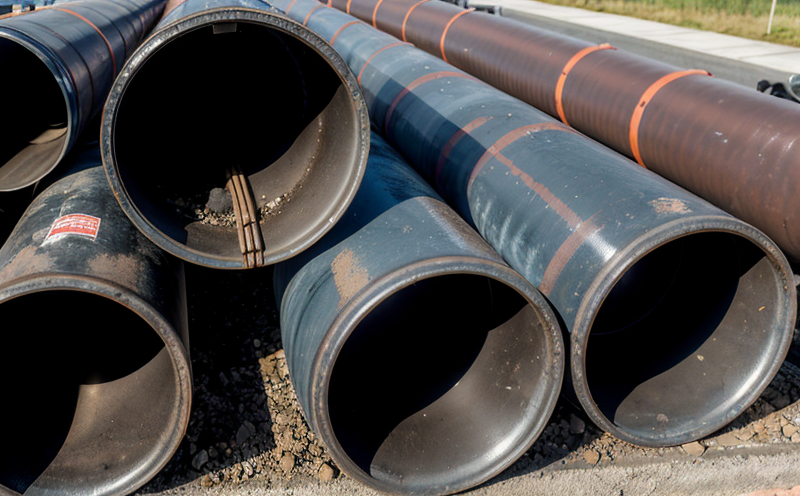EN 12201 Testing of Plastic Pipes for Water Supply
The EN 12201 standard is a crucial guideline for manufacturers and quality managers in the polymer and plastics testing sector. This test ensures that plastic pipes used in water supply systems meet stringent safety, durability, and performance criteria.
EN 12201 covers various aspects of pipe design, material selection, and manufacturing processes to guarantee that the final product is robust enough to withstand the pressures exerted by water distribution networks. The standard applies not only to pipes but also to fittings such as elbows, tees, and couplings.
The testing procedure under EN 12201 involves a series of mechanical and chemical assessments aimed at evaluating the physical properties of plastic materials used in pipe manufacturing. These tests ensure that the pipes can handle operational pressures without degradation or failure over time.
One key aspect of this standard is the requirement for manufacturers to perform hydrostatic testing, which simulates real-world conditions experienced by water supply systems. Hydrostatic pressure testing checks if the pipe maintains its structural integrity under prolonged exposure to water pressure, ensuring long-term reliability and safety.
The tests are conducted using specialized equipment designed specifically for this purpose. The setup typically includes a hydraulic testing machine capable of applying controlled pressures over an extended period. This ensures that any weaknesses in the pipe material or construction are identified early on during development rather than after installation.
Another critical component of EN 12201 involves examining the chemical compatibility between different materials present within the piping system. For instance, when joining dissimilar materials like PVC and copper, it's essential to ensure that there is no adverse reaction leading to corrosion or reduced lifespan due to leaching.
Testing for flexibility also plays a vital role in determining whether plastic pipes can bend without breaking during installation or if they will remain flexible enough to accommodate slight movements in the network over time. This characteristic is especially important in areas where ground shifts are common.
Air tightness tests further ensure that joints between pipe sections and fittings do not allow air infiltration, which could lead to pressure loss within the system. Proper sealing of connections helps maintain consistent flow rates throughout the entire distribution network.
Manufacturers must also consider environmental factors such as UV radiation exposure when selecting materials for use in outdoor applications. Exposure to sunlight can cause discoloration and reduced strength over time, impacting both aesthetics and functionality.
In summary, EN 12201 provides a comprehensive framework ensuring that plastic pipes used in water supply systems are safe, reliable, and capable of withstanding the demands placed upon them during operation. Compliance with this standard enhances confidence among consumers regarding product quality while meeting regulatory requirements set forth by authorities responsible for public health.
Applied Standards
| Standard Number | Title | Scope |
|---|---|---|
| EN 12201-1 | General principles | This part specifies the general requirements for the mechanical and chemical testing of plastic pipes intended for use in water supply systems. It outlines the basic guidelines that all subsequent parts should follow. |
| EN 12201-2 | Specification of test methods | This part provides detailed descriptions of various tests, including hydrostatic testing, flexural strength determination, and air tightness checks. It also covers procedures for sample preparation and interpretation of results. |
Benefits
- Safety: Ensures that plastic pipes are free from defects that could lead to leaks or burst pipes, thereby protecting public health.
- Durability: By adhering to EN 12201 standards, manufacturers can extend the service life of their products, reducing replacement costs and environmental waste.
- Regulatory Compliance: Meeting these international standards helps businesses avoid potential legal issues related to non-compliance with local regulations regarding water supply infrastructure.
- Customer Confidence: When a company demonstrates adherence to recognized standards like EN 12201, it builds trust among customers who are more likely to choose products from reputable suppliers.
Why Choose This Test
The EN 12201 testing ensures that plastic pipes manufactured for water supply applications meet stringent quality standards. Compliance with this standard guarantees durability, safety, and reliability throughout the entire service life of the piping system.
By undergoing rigorous mechanical and chemical evaluations as specified by EN 12201, manufacturers can identify any potential weaknesses in their products early on during development stages. This proactive approach allows them to address issues before they become critical defects that could compromise performance or pose risks to end users.
The tests conducted under this standard provide valuable insights into how different materials behave under specific conditions relevant to real-world use cases. For instance, hydrostatic testing simulates the continuous pressure experienced by water supply systems over extended periods. Flexural strength determination assesses whether pipes can bend without breaking during installation or when subjected to slight movements in the network.
Furthermore, air tightness checks ensure that joints between pipe sections and fittings are properly sealed, preventing any air infiltration into the system. This helps maintain consistent flow rates throughout the entire distribution network, optimizing performance and efficiency.





